Find out your computer's operating system
Now that you know some basics of how to use a computer, it's time to learn more about your computer's operating system. We will talk about the two most popular operating systems in this article, which are Microsoft Windows and macOS.
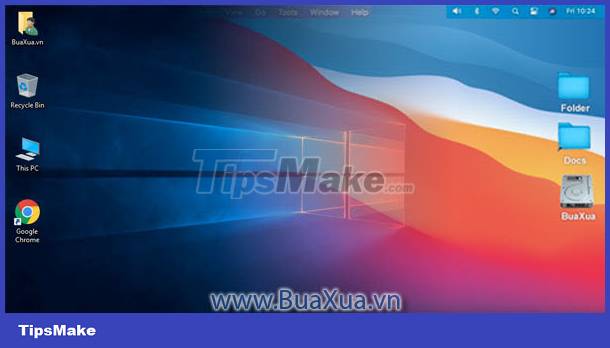 Find out your computer's operating system
Find out your computer's operating system
Most computers come with an operating system pre-installed. If your computer does not have an operating system installed or you want to reinstall another operating system for your computer, please see the instructions on how to install Windows
Get familiar with the interface of the operating system
Both PC and Mac use graphical user interface - GUI and they each have their own interface. After the operating system on the computer has finished booting, the desktop - Desktop will appear with the program's icons ready for you to use.
Windows operating system
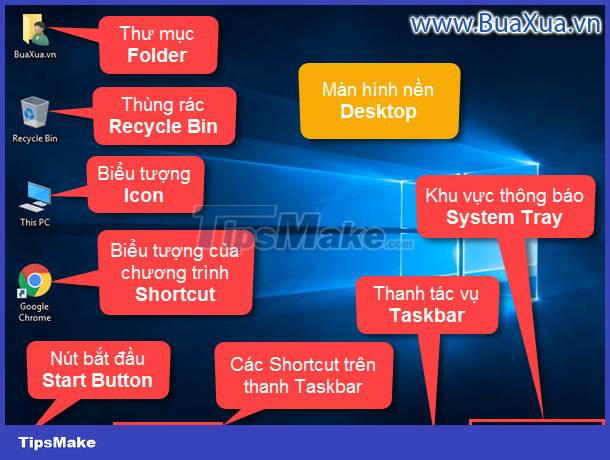 Windows operating system interface
Windows operating system interface
Desktop - Desktop
The desktop is the main workspace on your computer. From here, you can access your files, folders, application programs, and more.
You can also customize the desktop by choosing a different wallpaper for the screen, also known as Wallpaper .
Items - Item
You can see folders - Folders , files - Files and icons - Icons or shortcuts - Shortcuts on the desktop for easy access to them. You can tell them apart by their shape and they are all collectively referred to as Item .
Recycle Bin - Recycle Bin
When you delete a file, it is moved to the recycle bin. This allows you to restore files if you change your mind.
To permanently delete files in the recycle bin, you will need to empty the recycle bin.
Start Button - Start Button
In most versions of Windows, you will click the Start button to open the Start Menu - Start Menu . There are many things that you need to find out.
Taskbar - Taskbar
The taskbar contains shortcuts for applications. When you open a program or file, it appears on the taskbar and you can easily switch between different programs by clicking to select them on the taskbar.
Shortcuts on the Taskbar
Some programs will have a shortcut on the taskbar for easy access. You can completely add or remove shortcuts on the taskbar.
Notification Area - Notification Area
In the area to the right of the taskbar is the notification area aka the System Tray , you will also see the date and time. There will also be shortcuts to various settings, like Internet connection settings and sound.
macOS OS
 macOS operating system interface
macOS operating system interface
Desktop - Desktop
The desktop is the main workspace on your computer. From here, you can access your files, folders, application programs, and more.
You can also customize the desktop by choosing a background image for the display, also known as Wallpaper .
Items - Item
You can see folders - Folders , files - Files and icons - Icons or shortcuts - Shortcuts on the desktop for easy access to them.
You can tell them apart by their shape and they are all collectively referred to as Item .
Trash - Trash
When you delete a file, it is moved to the recycle bin. This allows you to restore files if you change your mind.
To permanently delete files in the recycle bin, you will need to empty the recycle bin.
Apple Icons - Apple Icon
In the top left corner of the screen is an apple icon, which you can click to access system preferences - System Preferences , recently opened documents - Recent Documents and more. You can also use it to shut down - Shut Down your computer.
Menu Bar - Menu Bar
The Menu Bar will contain different Menu options and change depending on the program you are using.
Notification Center - Notification Center
In the area to the right of the Menu bar is the notification display area, you will also see the date and time. There will also be shortcuts to various settings, like Internet connection settings and sound.
Dock
The Dock is an area that can contain shortcuts to applications, files, and folders. If you have multiple programs open, they will show up here and you can quickly switch between them.
Launchpad
Launchpad lets you see a list of all your apps. It's designed to make it easier for you to find and organize your apps.
You can also press the Launchpad key on your Mac's keyboard.
Windows and Dialogs
Regardless of the operating system, you will see windows of application programs called Window or App Window.
Dialog - Dialog Box usually appears in response to your action and requires you to take some action.
For example, in the image below, when you close the Paint application window , a dialog box will appear asking if you want to save the changes to this file. Click the Save button if you want to save it, click the Don't save button if you don't want to save it, or click the Cancel button to cancel the command to close the window and continue working with this application.
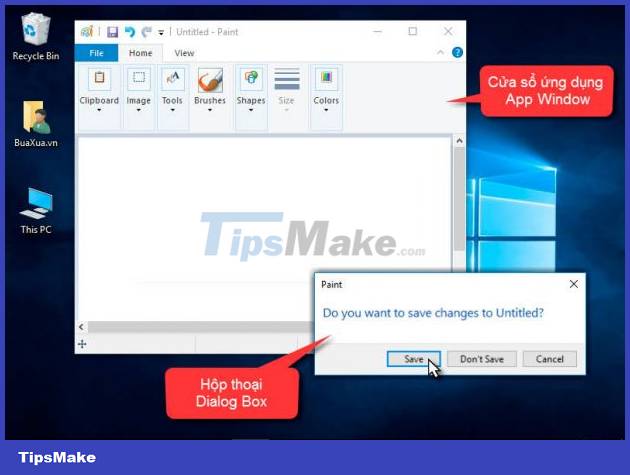 Windows and Dialogs
Windows and Dialogs
Open and close the program
- When you want to open a program, click on that Item. Normally, if the items are on the desktop, you have to double-click the left mouse button to open them. If they are on the Menu bar , Taskbar or Dock , just click the left mouse button once.
- Depending on what the Item is, it will open full screen - Full Screen or open in a window - Windows of the respective program. You can open multiple programs, each program will be opened in a separate window and you can switch back and forth to use at the same time.
- When you want to close a program window, you can click the red X button in the upper right corner for Windows or the left side for Mac. Or you can also access the File menu and then choose Close or Exit .
 Close a program window in Windows
Close a program window in Windows
Adjust your computer settings
When you start using a new computer, you can start by adjusting your computer's settings. Adjusting your settings can range from simple tasks like changing the desktop background to more advanced tasks like adjusting keyboard or privacy settings.
- In Windows 10, click the Start button - Start Button , then select Settings . In Windows 8.1 and earlier, click the Start button - Start Button , then select Control Panel - Control Panel .
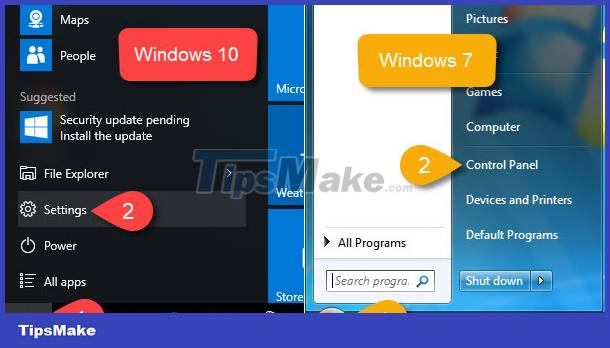 Adjust computer settings in windows
Adjust computer settings in windows
- On a Mac, click the Apple icon , then select System Preferences .
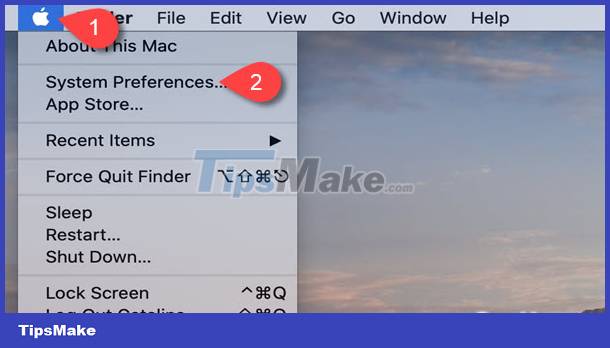 Adjust desktop settings in macOS
Adjust desktop settings in macOS
Turn off your computer
Unlike electrical appliances, you cannot normally turn off your computer with the power button. When you're done using your computer and want to shut it down, it's important to shut it down properly called Shut Down .
- To turn off a computer using the Windows operating system, click the Start button - Start Button , then select Shut down from the Menu. In some other versions of Windows, this icon may be Turn Off Computer or look like the power button - Power icon .
 Turn off the computer using the Windows operating system
Turn off the computer using the Windows operating system
- To shut down your Mac, click the Apple icon , then select Shut Down .
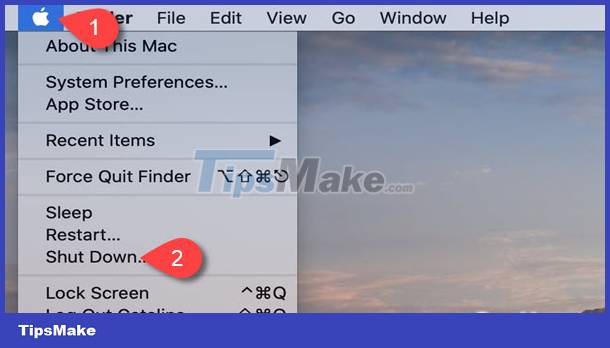 Turn off the computer using the macOS operating system
Turn off the computer using the macOS operating system
- After the computer has turned off, all you have to do is press the power button on the computer screen to turn it off.
You may not need to unplug the computer from the outlet or disconnect the power from the outlet after the computer Shut Down .